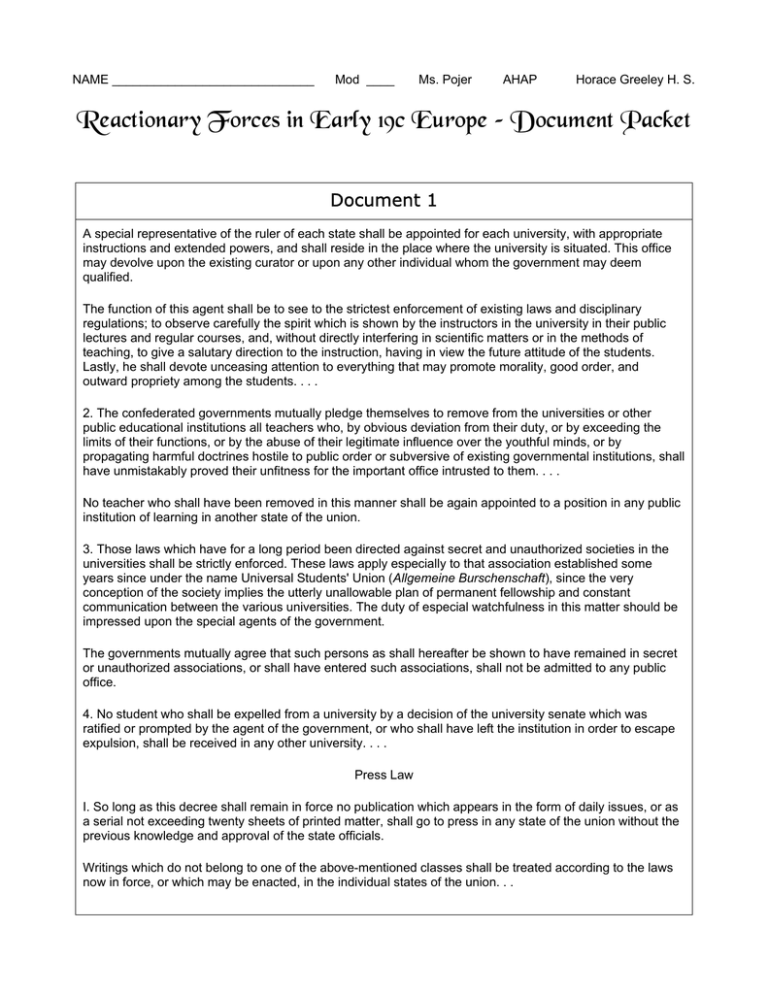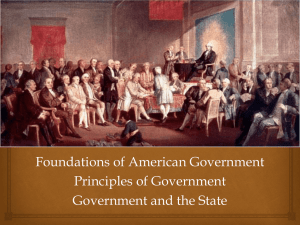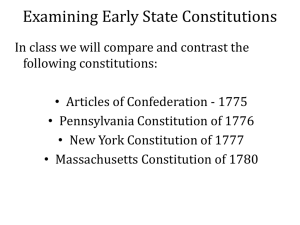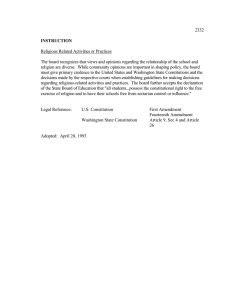Reactionary Forces in Early 19c Europe – Document Packet Document 1
advertisement

NAME _____________________________ Mod ____ Ms. Pojer AHAP Horace Greeley H. S. Reactionary Forces in Early 19c Europe – Document Packet Document 1 A special representative of the ruler of each state shall be appointed for each university, with appropriate instructions and extended powers, and shall reside in the place where the university is situated. This office may devolve upon the existing curator or upon any other individual whom the government may deem qualified. The function of this agent shall be to see to the strictest enforcement of existing laws and disciplinary regulations; to observe carefully the spirit which is shown by the instructors in the university in their public lectures and regular courses, and, without directly interfering in scientific matters or in the methods of teaching, to give a salutary direction to the instruction, having in view the future attitude of the students. Lastly, he shall devote unceasing attention to everything that may promote morality, good order, and outward propriety among the students. . . . 2. The confederated governments mutually pledge themselves to remove from the universities or other public educational institutions all teachers who, by obvious deviation from their duty, or by exceeding the limits of their functions, or by the abuse of their legitimate influence over the youthful minds, or by propagating harmful doctrines hostile to public order or subversive of existing governmental institutions, shall have unmistakably proved their unfitness for the important office intrusted to them. . . . No teacher who shall have been removed in this manner shall be again appointed to a position in any public institution of learning in another state of the union. 3. Those laws which have for a long period been directed against secret and unauthorized societies in the universities shall be strictly enforced. These laws apply especially to that association established some years since under the name Universal Students' Union (Allgemeine Burschenschaft), since the very conception of the society implies the utterly unallowable plan of permanent fellowship and constant communication between the various universities. The duty of especial watchfulness in this matter should be impressed upon the special agents of the government. The governments mutually agree that such persons as shall hereafter be shown to have remained in secret or unauthorized associations, or shall have entered such associations, shall not be admitted to any public office. 4. No student who shall be expelled from a university by a decision of the university senate which was ratified or prompted by the agent of the government, or who shall have left the institution in order to escape expulsion, shall be received in any other university. . . . Press Law I. So long as this decree shall remain in force no publication which appears in the form of daily issues, or as a serial not exceeding twenty sheets of printed matter, shall go to press in any state of the union without the previous knowledge and approval of the state officials. Writings which do not belong to one of the above-mentioned classes shall be treated according to the laws now in force, or which may be enacted, in the individual states of the union. . . 4. Each state of the union is responsible, not only to the state against which the offense is directly committed, but to the whole Confederation, for every publication appearing under its supervision in which the honor or security of other states is infringed or their constitution or administration attacked. . . . 6. The Diet shall have the right, moreover, to suppress on its own authority, without being petitioned, such writings included in Article I, in whatever German state they may appear, as, in the opinion of a commission appointed by it, are inimical to the honor of the union, the safety of individual states, or the maintenance of peace and quiet in Germany. There shall be no appeal from such decisions, and the governments involved are bound to see that they are put into execution. . . . 7. When a newspaper or periodical is suppressed by a decision of the Diet, the editor thereof may not within a period of five years edit a similar publication in any state of the union. Establishment of an investigating Committee at Mayence 1. Within a fortnight, reckoned from the passage of this decree, there shall convene, under the auspices of the Confederation, in the city and federal fortress of Mayence, an extraordinary commission of investigation to consist of seven members, including the chairman. 2. The object of the commission shall be a joint investigation, as thorough and extensive as possible, of the facts relating to the origin and manifold ramifications of the revolutionary plots and demagogical associations directed against the existing constitution and the internal peace both of the union and of the individual states; of the existence of which plots more or less clear evidence is to be had already, or may be produced in the course of the investigation. . . . 10. The central investigating commission is to furnish the Diet from time to time with a report of the results of the investigation, which is to be carried out as speedily as possible. . . . SOURCE: Carlsbad Decrees, September 20, 1819. Document 2 110. Metternich to Stadion, Paris June 23, 1808. 110. I have confused the idea of having one day drawn your Excellency's attention to the editors of the Frankfurt and Augsburg Gazettes. There is a most urgent necessity to exercise some influence over newspapers in general, and particularly over these two, which never cease spreading lies, often of the most ridiculous nature, about us. It is from these that most of the articles are extracted which are found in the French journals. Why should not correct news be communicated to the different newspapers? Why do they not control their correspondents at Vienna, and why should they not refute these lies in the places where they are published ? A great fault which all the Governments, and particularily our own have committed since the commencement of the French Revolution, is that they have regarded as useless, as beneath their dignity and that of the good cause, and indeed even as dangerous, to speak truth to the public, and to speak it incessantly. This fact is never more incontestable than when the French are concerned. They have the game to themselves; they have only occupied an empty place by seizing the desks of the journalists, and no one can reproach [p. 226] them with silence; they have taken up the weapon we have disdained to make use of, and they are now employing it against ourselves. The use of a thing is confounded everywhere with its abuse; the condition of a pamphleteer with that of a political writer; the man who reasons, with the one who simply relates correct facts ! Public opinion is the most powerful of all means; like religion, it penetrates the most hidden recesses, where administrative measures have no influence. To despise public opinion is as dangerous as to despise moral principles; and if the latter will rise up even when they have been almost stifled, it is not so with opinion; it requires peculiar cultivation, a continued and sustained perseverance. Posterity will hardly believe that we have regarded silence as an efficacious weapon to oppose to the clamors of our opponents, and in a century of words! Who can blame us if we will not allow the public to be supplied with lies about us ? There is not one of the above-mentioned papers which does not say under the heading of Vienna that we are in full negotiation on important points, or which does not publish lies about facts and individuals. The public cannot distinguish if news is true or false. False news has the air of being true if no one can he found to contradict it, and I place the Emperor Napoleon at the heal of the credulous public. There is a great difference between what he conceives and what is insinuated to him; it would be found very difficult to change what he wishes, but his credulity may be imposed upon. I beg your excellency to pay particular attention to this subject. Nothing is more easy than to avoid the official style in these publications, which have no merit if [p. 227] they bear that impression. I speak to you from a place where, more than anywhere else, I can appreciate the success of the efforts of the Government to influence the public. The newspapers are worth to Napoleon an army of three hundred thousand men, for such a force would not overlook the interior better, or frighten foreign Powers more, than half a dozen of his paid pamphleteers. SOURCE: Prince Metternich, “On the Necessity of the Censorship of the Press,” 1808. Document 3 The more we examine the influence of human agency in the formation of political constitutions, the greater will be our conviction that it enters there only in a manner infinitely subordinate, or as a simple instrument; and I do not believe there remains the least doubt of the incontestable truth of the following propositions: 1. That the fundamental principles of political constitutions exist before all written law. 2. That a constitutional law is, and can only be, the development or sanction of an unwritten pre-existing right. 3. That which is most essential, most intrinsically constitutional, and truly fundamental, is never written, and could not be, without endangering the state. 4. That the weakness and fragility of a constitution are actually in direct proportion to the multiplicity of written constitutional articles. .................... To this general rule, that no constitution can be made or written, à priori, we know of but one single exception; that is, the legislation of Moses. This alone was cast, so to speak, like a statue, and written out, even to its minutest details, by a wonderful man, who said, Fiat! without his work ever having need of being corrected, improved, or in any way modified, by himself or others. This, alone, has set time at defiance, because it owed nothing to time, and expected nothing from it; this alone has lived fifteen hundred years; and even after eighteen new centuries have passed over it, since the great anathema which smote it on the fated day, we see it, enjoying, if I may say so, a second life, binding still, by I know not what mysterious bond, which has no human name, the different families of a people, which remain dispersed without being disunited. So that, like attraction, and by the same power, it acts at a distance, and makes one whole, of many parts widely separated from each other. Thus, this legislation lies evidently, for every intelligent conscience, beyond the circle traced around human power; and this magnificent exception to a general law, which has only yielded once, and yielded only to its Author, alone demonstrates the Divine mission of the great Hebrew Lawgiver.... But, since every constitution is divine in its principle, it follows, that man can do nothing in this way, unless he reposes himself upon God, whose instrument he then becomes. Now, this is a truth, to which the whole human race in a body have ever rendered the most signal testimony. Examine history, which is experimental politics, and we shall there invariably find the cradle of nations surrounded by priests, and the Divinity constantly invoked to the aid of human weakness.... Man in relation with his Creator is sublime, and his action is creative: on the contrary, so soon as he separates himself from God, and acts alone, he does not cease to be powerful, for this is a privilege of his nature; but his action is negative, and tends only to destroy.... There is not in the history of all ages a single fact which contradicts these maxims. No human institution can endure unless supported by the Hand which supports all; that is to say, if it is not especially consecrated to Him at its origin. The more it is penetrated with the Divine principle, the more durable it will be. SOURCE: Joseph DeMaistre, The Divine Origins of Constitutions, 1810.






